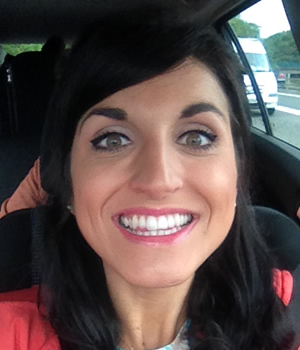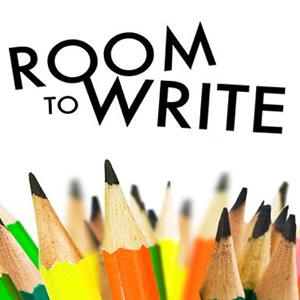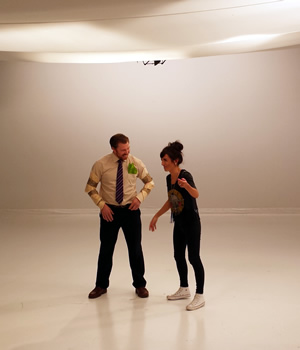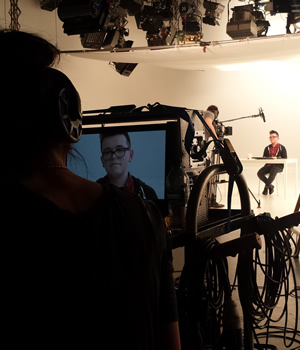BBC Room To Write producer and director Laura Marks interview

Laura Marks is the Producer and Director behind the BBC's Room To Write video sketches. Talking to Laura below, we find out more below about what Room To Write is and get some good writing, producing and directing tips...
Hi Laura. So what is Room To Write?
Room to Write is a BBC Comedy and BBC Writersroom initiative to select a group of comedy writers to work with BBC Scotland's Comedy Production team, and each other, in creating the next wave of Scottish comedy shows.
It's a rare opportunity to learn from some great people, and to be part of an active online comedy writing forum. The 22 selected writers have the chance to develop their scripts, gain professional feedback and have their work read by comedy producers.
In May 2014, BBC Comedy ran workshops in Scotland led by an Executive Producer and experienced writers. It was an opportunity to find out the kind of material BBC Comedy were looking for, the best ways to make your script distinctive and get more information about Room To Write.
The 22 writers selected from the material submitted have been working closely with BBC Comedy Scotland to develop their ideas for Scottish comedy shows. They've been involved in a series of comedy writing challenges and workshops throughout 2014, with feedback from the BBC Scotland Comedy team.
2015 sees the same group working to hone their skills even more and continue in flexing their comedy writing muscles. All selected writers were invited to join an online comedy writing forum to share ideas and comment, feedback and support each other.
In January this year, Room To Write culminated in twenty one monologue comedy shorts, which can be watched on the BBC website
There are also two fantastic and very useful blogs from two of our writers on the initiative here:
Blog from Kim MacAskill and Blog from Keiron Nicholson

So going into a bit more detail... how did you select which writers to work with?
We received around 1000 sketches for entry on to the scheme and these were subject to a lot of reading and sifting by professional comedy readers and producers. We were looking for sketches that were unusual, surprising, daring and that showed potential. There really is so much writing talent on offer, so the decision process was very difficult. The Monologues are all very varied.
How were the monologues developed?
Each writer submitted their monologue on an agreed deadline and then the fun process of editing and honing these began. I worked with each writer and BBC Script Editor Max Davis to get these scripts to a filming stage.
A few of them changed more than others in order to make the filming achievable. Others had more minor changes. The writers really enjoyed writing these monologues so they tended to be quite long in the first instance. It's difficult cutting down material but was vital to get scripts to time and keep it short, snappy and shareable.
As you touch upon, the end sketches all come in around 2 to 3 minutes long. How important was it they were fairly snappy?
It was a conscious decision to make them short. Not only did it give the writers an interesting challenge, but it also allows the content to be welcoming to viewers.
As all 21 of them sit together on a page, they provide fun and accessible viewing where you can watch a few at a time.
I am also a big fan of comedy shorts and sketch comedy so for me it was an interesting challenge in terms of producing them and cutting them back.

You filmed the sketches in a white room with minimal props. What was the thinking behind this?
I wanted to achieve something that looked really uncluttered where the focus was on the character and the words. The idea was to have the scripts and characters really fill the space, so that there wasn't really a need for elaborate sets and props.
Plus all 21 of them were filmed in one day, so it would have been impossible for 21 set changes.
That is a lot to shoot in one day. Can you talk more about that...
Time really was a major factor. I rehearsed each actor in the days leading up to the shoot and they were all briefed that we would aim to film each monologue in around 3 takes.
I used two cameras (an Alexa and an Amira) and shot each take covering two specific shots. Usually a wide and mid shot on the first pass and then a side profile and extreme close up on the 2nd. We'd then do some pick-ups or any other specific shots required for each monologue on the 3rd pass.
I have to say that the actors were so well prepared that they made my job very easy and we even finished the day 15 minutes early... that doesn't seem like a big deal but it certainly felt like it!
The editing process was a lot of fun. As there was a constant theme across all the monologues, it was really just a case of piecing together the best takes and shots for each line and making each piece the best it could be.
We also had a great time editing together an online trailer from some additional slow motion footage that we shot on the day. I really tried to reflect each character in this mini trailer so that it was almost a comedy short of its own.

You worked with a number of actors to create the shorts. Acting is a competitive field to get into. Can you offer any tips for aspiring actors looking to enter this industry?
One of my biggest aims for these shorts was to use up-and-coming actors. With the writers all being new to the scene, it felt like the best approach.
I think the best advice I would give to aspiring actors is to get out there and be seen as much as possible. Very often I will see an actor on stage, at a comedy club or even just in a clip they have sent me and that will catch my eye.
For the monologues I visited performing arts centres and universities, along with bringing on board young actors who I had previously seen. It was really important to me to find new faces and help give them a platform too. We have all been in that position in one way or another. Comedy acting is a skill and when you find new actors who are great at it, it's brilliant.
Meanwhile, still with your Producer and Director hat on, do you have any tips for writers?
Write it. Read it. Read it again. Ditch the bits you skip over when you're re-reading. Ditch the bits you keep reading and aren't sure of. Ditch the bits that feel long. Read it again. Spellcheck it. Send us it...
The above rules do apply, but the best advice I would give is to create a world and brilliant characters who an audience at home would want to watch over and over again. Might sound like a cliché but I could watch Will & Grace again and again and still enjoy each episode and feel something for the characters. And on a bigger note - if you love what you have written, someone else will too, so stick at it.
Thanks for the great insight and advice Laura!
I've got a new Twitter account: @misslauramarks - follow me for fun and updates from our brand new BBC One sitcom Mountain Goats, coming soon.
Watch the 21 Room To Write monologues here
Keep an eye on BBC Writersroom for news of future BBC schemes like Room To Write.
This article is provided for free as part of BCG Pro.
Subscribe now for exclusive features, insight, learning materials, opportunities and other tools for the British comedy industry.

